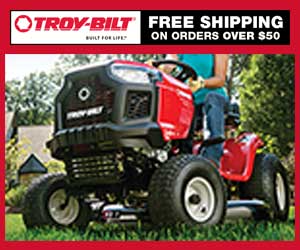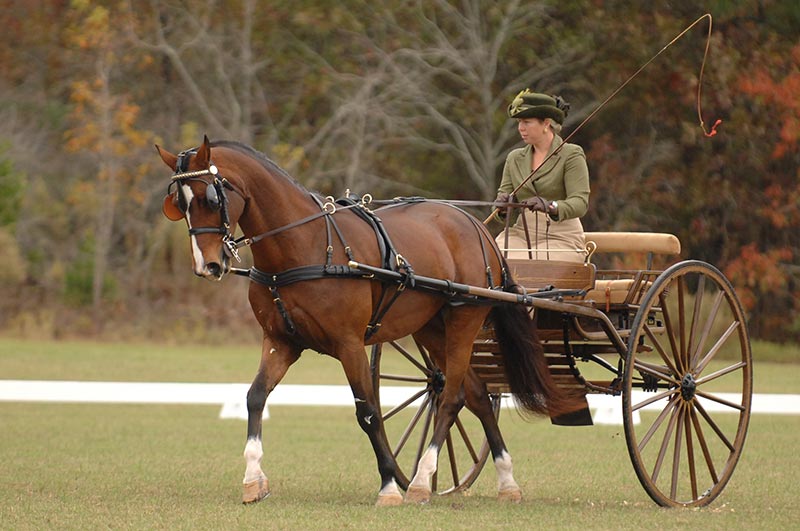
by Lynn Ascrizzi
Smucker Harness is stitching its way to success by focusing on the carriage-driving market.
The pocket-sized community of Churchtown, Pennsylvania (pop. 484), is one of those places you might drive right by, in a wink. But there, set along Route 23, amid a smattering of local businesses, vintage and modern homes and picturesque farmland, is the neat-as-a-pin, busy workshop that is Smucker Harness Co.
The small business, which produces first-rate, custom-hand built, equestrian show and pleasure harness, is owned and operated by skilled leatherworker Daniel M. Smucker. His 3,000-square-foot workshop is situated on the first floor of a three-story, metal-roofed building. “We’re just outside of Narvon,” he said, of the much larger community that is also part of Lancaster County’s celebrated Amish country.
Smucker, 35, bought the small family business from his parents, Moses and Susie Smucker, in 2008. “It shows I could stand on my own,” he said, of the purchase he made when in his 20s. The business site “was originally a barn, but my dad converted the timber-frame building into a workshop. Most of the tools were purchased from Dad, when I purchased the building.”
The year that he shouldered the family enterprise also marked the beginning of the Great Recession. “We downsized pretty majorly. We started specializing in certain products. We decided to focus on carriage show harness and higher-end products,” he said.
Currently, the harness shop has three employees, which include Smucker and two local leatherworkers. His wife, Rachel Ann, works part-time in the shop as a stitcher. “She does a lot of sewing for me. She’s a good seamstress, and it was easy for her to learn stitching. We also have a few ‘sub-jobs,’ ” he added, referring to part-time sub-workers. "I‘d like to hire more. It’s a challenge. I’m looking for experienced leatherworkers.”
The workshop team handles all the leather harness and bridle orders. “We do it all ourselves,” he said.
SMALL BUT SAVVY
The harness company may be small, but in the past several years, Smucker has gained a sizable amount of economic traction in the competitive, harness-making business. “It’s a small market,” he said.
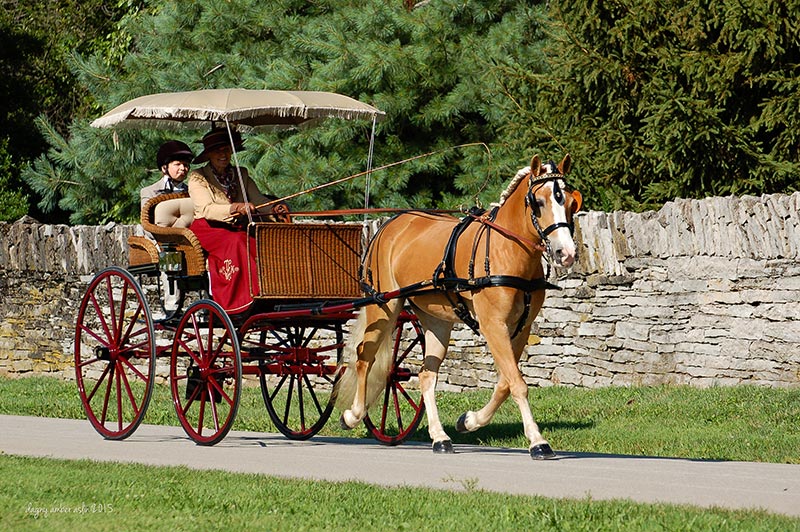
Some of his key strategies are:
• Stick to your niche: The shop’s biggest area of growth comes from the carriage-driving customer, which Smucker sees as his niche market. “We’re doing mostly carriage harness for carriage driving,” he said, an area that includes harness for the extreme sport of maratation racing.
The majority of his customers are middle-to-upper-class folks, most of whom are women. This group has a passion for the charm and thrill of the equine-drawn, carriage-driving experience. Their vehicles might be anything from a small cart to a coach. And, their interests can range from recreational driving for enjoyment or taking part in sport-level and pleasure-driving competitions. Also, many are likely to be members of a carriage-driving organization, like The American Driving Society (ADS) or Carriage Association of America (CAA). “We have very little local business,” Smucker said, meaning that most of his work comes from outside the community.
“There are a lot of people in the pond, but it’s not endless. We’re chasing the same customer,” he said, citing two main competitors. Two years ago, however, he deepened that pond by lining up a fortuitous business connection with a director at Colonial Williamsburg, the famed, living-history museum set on the site of Virginia’s 18th-century capital. Founded in 1932, the restored historic spot has since attracted more than a million visitors.
“We do all their custom leatherwork. We just made them a four-in-hand coach harness set,” he said, this past February, a project that turned out to be one of his biggest, most financially rewarding orders. “Right now, Colonial Williamsburg is one of our largest accounts. We constantly have things on order from them. We have an order right now for coach straps. They have to look old-time. We try to source leather that will work for the application,” he said.
• Take no short cuts: The company promises prospective customers that no short cuts will be taken in the creation of their products. “We really stress quality,” he said.
• Keep prices reasonable: The workshop produces finely built, reasonably priced custom harness. Their handcrafted leather harness comes in a choice of black and russet colors.
Leather harnesses also come in different grades — Super Deluxe, Deluxe Show, Pleasure, Mara-tation (extreme-sport, marathon), Draft Horse Show and Fine Deluxe. “The difference is in the price and more detail. The higher the grade harness, the more detail and hand stitching,” he said.
Their most popular product line happens to be their most expensive. “Our Super Deluxe leather harness is competing with some of the top harness makers. We’re in a better price range. We’re making money on that. When you’re looking at the country and the world, our product has good value,” he said.
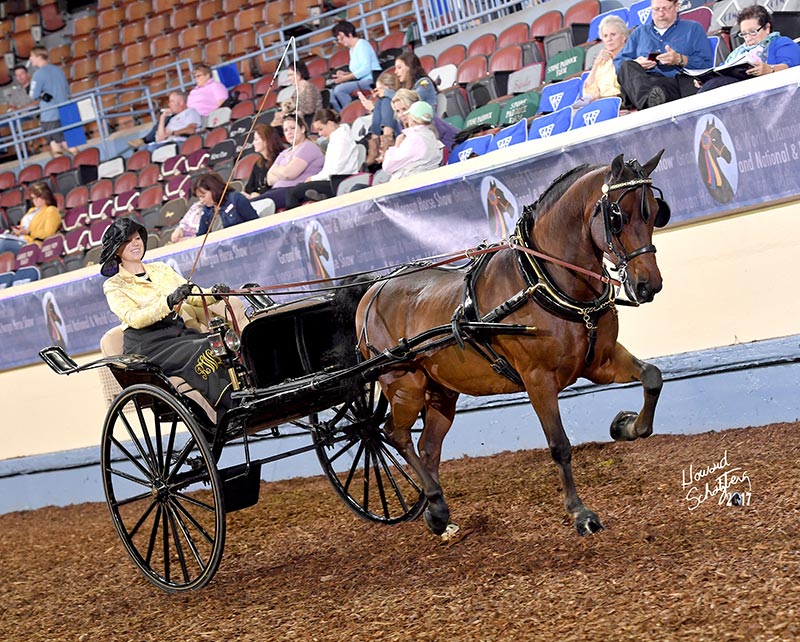
Harness prices range from $800 for a synthetic harness to around $3,000 for a leather show harness. “Most of the harness we sell is in the range of $2,000 to $4,000. Some people look at $3,000 for a harness as very expensive; some see it as reasonably priced. My goal is that the work will exceed the customers’ expectations,” he said.
• Build it to fit: The company guarantees their custom harness to fit the horse. “We don’t stock a lot of ready-made harness. We build them to fit,” he said. From time to time, he will go to a customer’s place, if they’re reasonably close by, to measure the horse. He recalled a memorable, on-site harness-fitting job in Oregon. “It was for a six-mule hitch. The customer covered travel expenses. That was the biggest job I’ve done, so far,” he said, of the $30,000 order. “I’ve also been down to Williamsburg to measure up their horses,” he added.
• Give one-on-one service: One of the inviting virtues of the small, personally run business is that customers have an opportunity to talk directly to a well-informed, real-time human being, a welcome service that often shrinks in direct proportion to the size of the company involved. Phone calls to Smucker Harness are regularly answered directly by Smucker. “The phone isn’t ringing off the hook. We’re not doing volume, we’re doing quality,” he said.
Most orders are taken over the phone or through email. Customers can also call or write for a 55-page, full-color print catalog, whose current edition was published in 2017. The handsome, succinctly-written catalog is also available at their website, www.smuckersharness.com. The catalog displays their harnesses, halters, bridles, collars and hames, and accessories, like horse-measuring tools and deer-hair-filled harness pads.
“We don’t make the pads here. We have a supplier. A local lady makes them. She has a little shop upstairs in a barn,” he said. Their harness hardware is sourced from Weaver Leather Supply of Mount Hope, Ohio, and Beiler’s Manufacturing & Supply of Ronks, Pennsylvania.
Also featured is the shop’s successful side business — door chimes designed with charming cat, dog, horse and cow silhouettes. “We do all that here, except the bells. This is a fairly large business. They’re all made out of leather — a good way to use up scrap leather. We sell them mostly wholesale, and some retail, online. We have a big customer in ‘Philly,’ ” he said.
The catalog also displays an array of carriage and sleigh bells. “It’s a small market,” he said, of the bells. “The workshop does all the leatherwork involved.” The solid brass, lacquered bells are imported from Weaver Leather.
The company website regularly attracts buyers, but he sees the site as “more of a tool for potential customers. With custom harness, we almost always need to talk to the customer. Most sales are made by phone or email,” he said.
Trade shows are not on his agenda, but he checks out an occasional horse show, namely, The National Drive in Lexington, Kentucky, which he attended last year. The organization is described at their website (www.nationaldrive.net), as “the largest single gathering of recreational equine drivers on the continent.”
So far, his business strategies are working. “In the last few years, there is more than enough business coming in. It’s been picking up every year for us, about 10 percent growth per year. Last year, we were very busy. More than we could handle. We used to do saddle and tack repair, but we dropped that part of the business and focused on more of what we want to do — custom harness and personal leather goods, like backpacks and women’s totes,” he said.
Occasionally, the shop needs to turn work away. “There’s always a wait. Most of the time, there’s a 4 to10 week lead-time. We turn work away that we don’t want to do, like saddles and riding tack.”
Smucker Harness ships all over the country. Most orders come from California and Florida. “A lot of the carriage-driving folks winter in Florida. Obviously, we have a lot of customers in Pennsylvania, too, as much as those two states,” he said. The company also ships worldwide, to places like Australia, Canada, England, Germany and Ireland.
EVERYDAY EQUIPMENT
The workshop’s hand tools of choice are mostly made by C.S. Osborne of Harrison, New Jersey. “If you have a good set of tools, you don’t need to swap out. Osborne is my go-to. I also go to auctions, like Weaver Leather (Consignment) Auction, pretty much every year. Or, I just buy tools from suppliers. I don’t buy a lot of new tools,” Smucker said.
As far as machinery goes, the workshop relies primarily on an American-made, Randall Union Lockstitch. “This one is about 120 years old and is still going strong. Campbell-Randall (Leather Machine Co. in Conroe, Texas) is making the machines. I can get parts from them,” he said. The shop also uses Adler 205 and Nakajima 441 sewing machines. Nylon thread is sourced from A&E (American & Efird, LLC) based in Mount Holly, North Carolina. And, among other tools, the shop is also home to a Fortuna splitter, a clicker press and an old, cast-iron blinders press.
LEATHER
The business offers both genuine and synthetic leather harness. “Ninety percent of our harness is made from leather. Everything we make is leather. We don’t produce the synthetic harness here. We subcontract that out to an Amish contractor,” he said. Smucker’s Supreme Synthetics™ line is made from BioThane® manufactured in Ridgeville, Ohio. “We have different price points for draft and carriage synthetic harness.”
Leather is sourced primarily from Wickett & Craig of Curwensville, Pennsylvania. “We use their harness and English bridle leather. Both are made of cowhide, but they’re made with a different process. Harness leather has more oils; it’s more supple and tends to be thicker. Bridle leather also has some oil. But, it’s not as thick and has a different finish,” he explained. He also purchases some select leather from Hermann Oak Leather of St. Louis, Missouri.
Currently, the company is expanding into wholesaling personal leather goods by making items like laptop cases, key fobs and backpacks. These are marketed with the brand name, Welsh Mountain Co. (welshmtn.com). “We do have some sub-shops working on some of that. There is a market for those items. People are more willing to spend money on a good product. We’re not competing, pricewise, with imported items. Our material is better. We’re offering a quality product made of quality leather,” he said.
IT STARTED WITH GRANDPA AND A LANDIS 16 STITCHER
Smucker Harness Co., of Churchtown, Pennsylvania, is currently owned and operated by Daniel M. Smucker. The small business was founded in 1962 by his grandfather and namesake, farmer and horse dealer Dan Smucker. “He was a jack-of-all-trades who dabbled in a little bit of everything,” his grandson said. Fifty-six years ago, in the hopes of finding a way to earn extra income for his family, Dan Smucker made a trip with his oldest son, Moses, to New York City and hauled home a Landis 16 stitcher. That was the beginning of his building and repairing saddles and harnesses for friends and neighbors.
After he passed away in 1970, his son, Moses, bought the business from his mother, Annie. He moved the workshop from the farm to a small corner in the basement of a barn in Churchtown. By 1981, he renovated the barn, doubled his shop space and added employees.
From the start, he established the company’s business model — offering top-quality products for moderate prices and giving excellent customer service. Before long, he expanded his customer base beyond the local area, attracting middle-to-upper income horse enthusiasts in the U.S. and abroad.
His son, Daniel, bought the business from his parents in 2008. It was a natural transition because he had followed his dad around in the workshop since he was able to walk. “It’s been a part of my life — a normal thing — being around leatherwork. Our house was close by and I’d play in the shop,” he said.
Today, he carries on the tradition begun by his enterprising grandfather and father; hence, the family business motto: Three Generations Strong.
QUOTES
“We’re doing mostly carriage harness for carriage driving. . . . Our Super Deluxe leather harness is competing with some of the top harness makers. We’re in a better price range . . . . When you’re looking at the country and the world, our product has good value.” — Daniel Smucker, owner and operator, Smucker Harness Co.
“Right now, Colonial Williamsburg is one of our largest accounts. We constantly have things on order from them.” — Daniel Smucker
“The higher the grade harness, the more detail and hand stitching . . . . My goal is that the work will exceed the customers’ expectations.” — Daniel Smucker
“In the last few years, there is more than enough business coming in. It’s been picking up every year for us, about 10 percent growth per year.” — Daniel Smucker
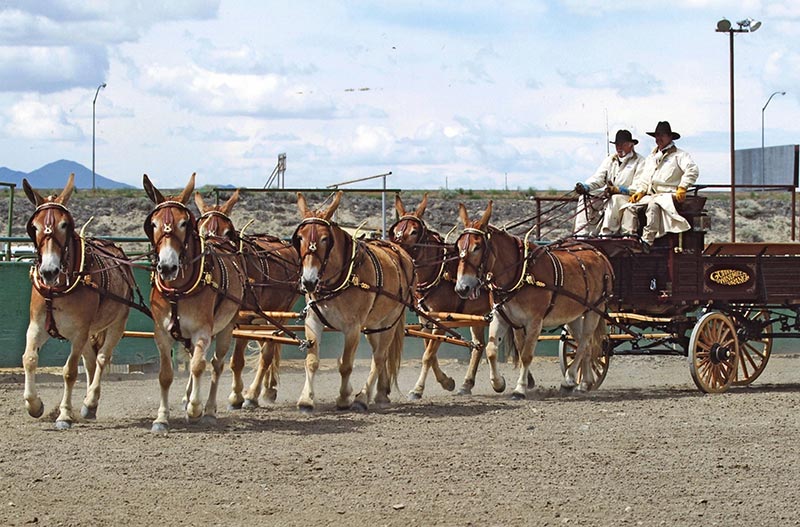
For more information about Smucker Harness, find them in our DRIVING section.
Find out more about all kinds of Tack from harness to saddles, visit our section on English & Western Tack.
Photographs Courtesy of Smucker Harness Co. This article was originally published by ShopTalk Magazine and is used here with permission.






